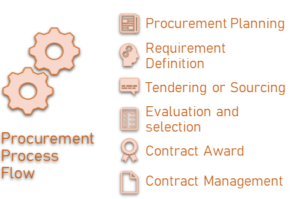Understanding procurement management, the simple way
A Procurement Management Process helps companies purchase goods and services from external suppliers, it further includes a series of activities and processes. The procurement management process comprises planning, selection, administering, and closing procurement i.e. awarding and managing the contract. It is vital for any organization to have a proper procurement management system so to avoid maverick spending and ensuring a high level of service received from the vendors and suppliers.
Key areas of procurement management are:

- Procurement Planning: Procurement planning is a process where the idea for the procurement is explored and elaborated. At this stage, important information related to materials required or need to be procured is gathered. Also, internal assessments and approvals are obtained to initiate the procurement process.
- Requirement Definition: In this step, requirement needs are addressed, which involves defining and describing the quantity, quality, and configuration or composition of items to be purchased. It is an outline of purchasing requirements that are required to meet the need for a project.
- Tendering or Sourcing: Procurement is commonly dispensed by the method of tendering, instead of buying a product directly from a merchandiser. An organization wants to obtain product or services can first specify its needs, later on, can open the bidding during a process called tendering.
- Evaluation and Selection: In this step, firms identify and evaluate the existing and new suppliers. This process helps in limiting suppliers in a selection pool.
- Contract Award: This occurs once the organization has reviewed all the offers, they received and made a decision on a contractor whose proposal best meets the company requirements and selection criteria.
- Contract Management: Contract management comprises drafting and negotiating the terms and conditions in contracts. Typically, a contract includes obligations, timelines, the scope of work, rights, and duties of the parties to the agreement, which could be referred to during any dispute or failure.
Procurement management plays a very crucial role in managing and optimizing an organization’s spends. If procurement and contracting teams rely on manual processes, spreadsheets to manage the pre and post-phases of contracts, it renders the overall management of contracts inefficient, time-consuming, high costs administration and exposes the organization to risk. An efficient contract management system ensures that financial and operational risk is minimized and vendor performance is maximized.
